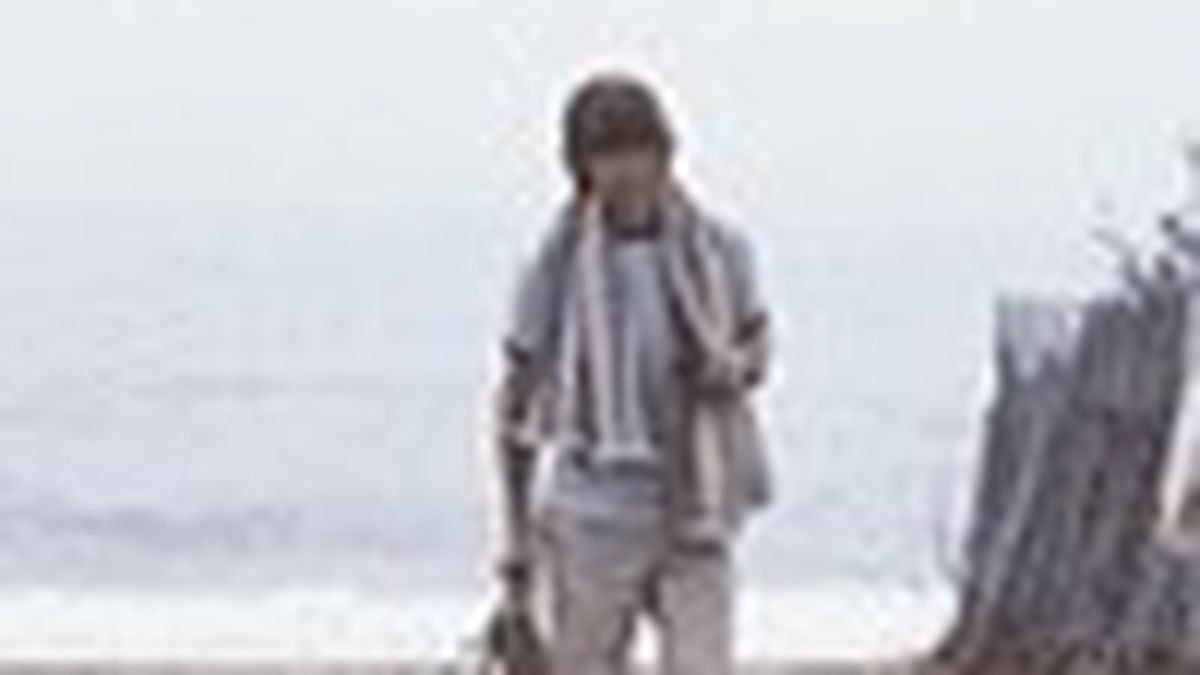The opening moments of The Door in the Floor are not promising. A little girl stands on a chair in a hallway of photos, pointing at the images and speaking about them. She is soon joined by a middle-aged man, probably her father, who takes her on a tour through the photos, helping her to recount them, to tell their stories. Nearly every photograph shows two boys, brothers, as blond as the girl. “Dead means they’re broken?” she asks.
The scene is both self-consciously explanatory and overly freighted. We are told too directly what is happening, and what has already happened, and what is happening means too much. We have just met these characters; we can’t yet trust them to hold what the scene asks them to hold.
Before long, however, things get considerably better. The girl’s father, a writer played by Jeff Bridges, reveals himself to be raucous, profligate, and debauched. Her grief-stricken mother, played by Kim Basinger, has largely turned to stone. And then a high school student arrives to serve as Mr. Cole’s assistant for the summer. His name is Eddie (Jon Foster), and he has long been a devoted fan of his employer; within moments of seeing his employer’s wife, Eddie is smitten with her, too. Now we’re cooking.
The Door in the Floor, adapted by writer and director Tod Williams from the first part of John Irving’s novel A Widow for One Year, is not unfamiliar. It has the icy chill of Ang Lee’s The Ice Storm; the haunted, atmospheric grief of Todd Field’s In the Bedroom; and the quirky-WASP abandon of Curtis Hanson’s Wonder Boys. It also basks in its share of Irving eccentricity, complete with a character whose outsize personality is so extravagant that it nearly balances the utter vacancy that characterizes his wife. Ted Cole is the kind of man whose grief manifests in alcoholism, sex, and spooky drawings of naked women. Marion Cole, on the other hand, has been sucked clean into the void. When asked about “the accident” (the unexplained event that killed her two sons), she disappears behind her eyes like a corpse.
Except when she’s with Eddie. The boy stirs something in her, and she responds to his affections — but not because she desires him. Instead, she feels compassion for his desire; she wants to give him what she isn’t sure her teenaged sons received before they died. (In one scene, as they make love in a beautiful room bright with afternoon light, Marion’s face is a train wreck of damage and loss.) For her, Eddie is far more than a sweet boy whose innocence is on its way out the window. He is, first, a surrogate son, and later a husband: It’s no accident that “Ted” and “Eddie” are essentially the same name, both nicknames for Edward. For Marion, this feast of the flesh is an extended goodbye to all of the men in her life, a gift to herself and her grief.
Marion Cole is not, suffice it to say, an easy role. Basinger takes a stab at it, and she does all right, after bombing her opening scene. But the part might have gone to someone with a little more gravitas. Also strange is Elle Fanning, playing Rose, the couple’s young daughter. This, too, is a spooky role, especially for such a young child: Rose is haunted by the brothers she never had, whose death her birth was meant to assuage, and she lives among the ruins, with one parent imploding and the other sloshing around in the muck. Fanning has perfected a kind of shifty-eyed perdition, a not quite definable less-than-okayness that’s unsettling. But there are times when her shtick (if a four-year-old can be said to have such a thing) falls flat.
On the other hand, Jeff Bridges is fabulous. His swaggering, half-assed, passive-aggressive Ted is both charming and despicable. Just when we think him worthy of nothing but condemnation, Bridges shows us something redeeming and real. Jon Foster’s Eddie is also a marvel, especially across from Basinger’s Marion, who is lifeless by design. Eddie is the film’s most accessible character, the one with whom the audience is meant to align, and Foster’s portrayal is robust — first deferential and halting, awed; later sobered and even soured. The arc is beautifully described.
Writer and director Williams has done an excellent job in both of his roles. Save for a couple of false notes, the script is dead on, offering clever parallels (especially with writing and texts) and several delicious payoffs; it’s immensely satisfying to reach the end of a movie and witness the blossoming of everything that was planted earlier, whether we’d remembered it or not. Yes, the title (taken from a children’s book written by Ted) is a mistake; it suits a story for children but not a serious adult drama that would do best not to overplay its guiding metaphor. That said, the image is handled well throughout the film, evoked precisely when we need to be reminded that someone, or more than someone, has disappeared down a hole.
Ultimately, The Door in the Floor is a surprisingly good film, not quite original but smart, careful, and steadfast in its dedication to its characters. It’s compassionately committed to exploring the lives of people who are sorely wrecked; it gives them the space to be irresponsible and bad. And through the eyes of its young interloper, it reminds us what it’s like to grow up.











